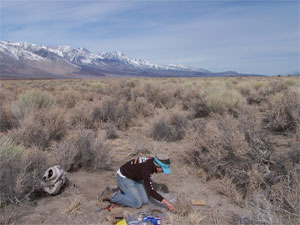Dr. Andrew Elmore along with colleagues from the College of William and Mary and the University of California, Los Angeles, have recently received funding from the National Science Foundation to continue their research in Owens Valley, California. They are conducting an analysis of the interactions between groundwater, soil and vegetation properties, and desert dust generation. Wind erosion of desert soils is thought to cause irreversible change to ecosystems, and the mobilized particulate matter can seriously degrade air quality. In deserts globally, regions that produce the most dust are characterized by low elevation depressions where wind erodible material has been and continues to be deposited fluvially. Shallow groundwater is often pumped from these regions for agricultural and municipal use. Since water demands are rapidly increasingly in many desert regions, there is increasing need to understand of how groundwater management might influence dust generation. Ideally, information could be attained that would guide groundwater management with the goal of promoting soil stability.

This project utilizes measurements of vegetation and soil conditions and wind velocities to model wind erosion at a range of sites that experienced successively greater groundwater fluctuation over the past 20 years. We will then compare these model results with direct measurements of recent soil loss using radiogenic fallout isotopes and dust traps. Finally, measurements of soil resource availability (nutrients and soil moisture) will be used to understand feedback processes between groundwater decline, soil loss, and ecosystem changes that might promote continued soil instability. The project will have a broad impact on our understanding of the role water management has on dust and air quality in deserts. The work will form collaborations between academic institutions and regulatory groups in the Owens Valley, California. The Inyo County Water Department, the Great Basin Unified Air Pollution Control District, and the Los Angeles Department of Water and Power will provide necessary data and expertise to the project and gain important information on how their vegetation and air quality management activities could be tailored to gain long-term sustainability.
